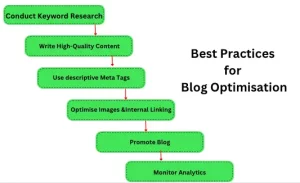How Does Blogging For SEO Is Useful?
The estimated global number of blogs is over 572 million. And 77% of people read blogs online. (Source) This makes blogging for seo concept more interesting.
Blogs are the major source of sharing information amongst a large audience. This is why blogs with 3000+ words get better results.
This was a sneak peek in the world of blogging which has a strength of 600 million blogs globally. In this vast pool of blogs, a reader read an average of 10 posts daily. Hence, keeping the readers updated with relevant and latest updates is important. Sharing meaningful information improves user-experience which affects the search engine rankings.
Let us dive deep into how blogging helps SEO?
What is blogging?
Blogging is writing and publishing content on a website or online platform, typically in regular posts or articles. These posts can cover various topics, from personal experiences and opinions to news and analysis on specific subjects.

Source:www.freepik.com
Blogs can be written by individuals, organisations, or companies and serve as a means of communication, self-expression, or marketing. The content of a blog is typically displayed in reverse chronological order, with the most recent posts appearing first.
Read: What is blogging in detail?
Different Types Of Blogs For SEO
Several types of blogs can be helpful for SEO (Search Engine Optimization):

How-to guides:
These are blog posts that provide step-by-step instructions for completing a specific task or solving a particular problem. These blog posts are often optimised for long-tail keywords and can attract traffic from people actively searching for solutions to their problems.
Listicles:
Listicles are blog posts listing several items related to a particular topic. For example, “10 Best Restaurants in New York City.” These blog posts are often shared on social media and can attract traffic to your website.
News and updates:
Blogging about news and updates related to your industry can be an excellent way to keep your website fresh and provide value to your readers. These blog posts are more likely to be shared on social media and attract backlinks.
Interviews:
Conducting interviews with experts in your industry and publishing them on your blog can be an excellent way to provide valuable content to your readers and attract backlinks.
Infographics:
Infographics are visual representations of information or data. They are often shared on social media and can attract traffic to your website. Creating infographics can be time-consuming, but they can be a powerful tool for SEO.
How does blogging help SEO?
Search engines love fresh content, and a blog is an excellent way to keep your website updated with new content regularly.
- Regularly publishing recent blog posts gives search engines more range to index and display in search results.
- Each blog post you publish allows you to target specific keywords and phrases related to your business or industry.
- Blogging can also help you build backlinks, which are links from other websites to your site. When you publish high-quality content on your blog, other websites are more likely to link to it, which can improve your site’s authority and search engine rankings.
Read: How to do SEO for small businesses?
Blogging can improve SEO, by:
Regularly publishing high quality content.
Publishing high-quality content regularly can attract backlinks, which can be beneficial for SEO in several ways:

- Increased authority: Backlinks from high-quality websites can improve your website’s authority and credibility in the eyes of search engines. This can lead to higher search engine rankings and more organic traffic to your website.
- Improved crawlability: Backlinks can help search engines crawl your website more efficiently. When search engine bots follow backlinks to your website, they can discover and index new pages more quickly, which can help improve your website’s overall visibility in search results.
- Referral traffic: Backlinks can also drive referral traffic to your website. When other websites link to your content, they essentially endorse and direct their readers to your content. This can lead to more traffic and potentially more conversions on your website.
It’s important to note that not all backlinks are created equal. Backlinks from spammy or low-quality websites can actually hurt your SEO efforts. Attracting backlinks from reputable and authoritative websites relevant to your industry or niche is essential.
Regularly publishing high-quality content can improve your website’s authority, crawlability, and referral traffic, leading to better SEO performance.
Targeting specific keyword
Targeting specific keywords can help in SEO (Search Engine Optimization) in several ways:

- Increased relevance: By targeting specific keywords, you can create more relevant content to the search queries people are using to find information related to your industry or niche. This can increase the chances of your content appearing in search results when people search for those keywords.
- Improved rankings: When your content is more relevant to specific keywords, search engines are more likely to rank it higher in search results. This can lead to more organic traffic to your website.
- Better user experience: By targeting specific keywords, you can create content that is more closely aligned with the needs and interests of your target audience. This can lead to a better user experience, increasing the likelihood of people spending more time on your website, engaging with your content, and potentially converting into customers.
It’s important to note that keyword targeting should be done naturally and strategically. Using keywords or using them in a spammy way can help your SEO efforts. It’s also important to focus on creating high-quality content that provides value to your target audience rather than simply stuffing keywords into your content.
Targeting specific keywords can help improve your website’s relevance, rankings, and user experience, leading to better SEO performance.
Read: 12 best keyword research tools for your business.
Social media engagement through comments
Social media engagement via comments on your blog posts can help in SEO (Search Engine Optimization) in several ways:

- Increased visibility: When people engage with your blog posts on social media, it can help increase the visibility of your content. This can lead to more people discovering and sharing your content, leading to more backlinks and organic traffic to your website.
- Improved engagement metrics: Social media engagement can also improve your website’s engagement metrics, such as time on site, bounce rate, and pages per session. When people engage with your blog posts on social media and then click through to your website, they are likelier to spend more time on your website and engage with more of your content.
- Social signals: Social media engagement can also send social signals to search engines, indicating that your content is valuable and relevant to people. Search engines may consider these social signals when ranking your content in search results.
- Community building: Social media engagement can also help you build a community around your brand or business. By engaging with people who comment on your blog posts on social media, you can build relationships with your audience and potentially convert them into customers or brand advocates.
Social media engagement via comments on your blog posts can help improve your website’s visibility, engagement metrics, social signals, and community-building efforts, leading to better SEO performance.
Updating your site with fresh content
Updating your site frequently with fresh content can help in SEO (Search Engine Optimization) in several ways:
- Improved crawlability: When you update your site frequently with fresh content, search engine bots will crawl your site more often to index your new content. This can improve your website’s crawl ability and search engine rankings.
- Increased relevance: Fresh content can also help make your website more relevant to current topics and trends in your industry or niche. This can increase the chances of your content appearing in search results when people search for related topics.
- More keyword opportunities: By regularly updating your site with fresh content, you can also target new keywords and keyword variations, which can help expand your website’s reach and increase organic traffic.
- Better engagement metrics: Fresh content can also help improve your website’s engagement metrics, such as time on site, bounce rate, and pages per session. When people see that your website is regularly updated with new content, they are likely to spend more time on it and engage with more of your content.
- More backlink opportunities: Fresh content can also attract more backlinks from other websites, improving your website’s authority and credibility in the eyes of search engines.
It is important to note that updating your site frequently with fresh content should be done naturally and strategically. Overloading your site with low-quality or irrelevant content can hurt your SEO efforts. It’s important to focus on creating high-quality, valuable content that provides value to your target audience.
Updating your site frequently with fresh content can help improve your website’s crawl ability, relevance, keyword opportunities, engagement metrics, and backlink opportunities, leading to better SEO performance.
Best Practices for Optimising Your Blog for SEO
Here are some best practices for optimising your blog for SEO (Search Engine Optimization):
- Conduct keyword research: Use tools like Google Keyword Planner or SEMrush to identify relevant keywords and phrases your target audience is searching for. Use these keywords strategically in your blog titles, subheadings, and content.
- Write high-quality content: Focus on creating high-quality, engaging content that provides value to your target audience. Your content should be well-researched, informative, and easy to read.
- Use descriptive meta tags: Include meta tags, such as titles and meta descriptions, for each blog post. These tags provide a brief summary of your content and help search engines understand what your content is about.
- Optimise your images: Optimise your images by using descriptive filenames and alt tags. This helps search engines understand the content of your pictures and can also improve your website’s accessibility.
- Use internal linking: Use internal linking to connect related blog posts and pages within your website. This can improve your website’s crawl ability and provide a better user experience for your readers.
- Promote your blog: Promote your blog on social media and other relevant platforms to increase visibility and traffic to your website. This can also lead to more backlinks and improved search engine rankings.
- Monitor your analytics: Use tools like Google Analytics to monitor your website’s performance and track your progress over time. Analyse your traffic sources, bounce rate, and other key metrics to identify areas for improvement and adjust your strategy accordingly.
Conclusion
Blogging can help improve your SEO (Search Engine Optimization) in several ways. Regularly publishing high-quality, relevant content with targeted keywords can attract more organic traffic to your website, increase engagement metrics, and attract more backlinks from other websites.
Updating your site frequently with fresh content can improve your website’s crawl ability, relevance, keyword opportunities, engagement metrics, and backlink opportunities.
Following best practices for optimising your blog for SEO can improve your website’s visibility, relevance, and authority, leading to better search engine rankings and more organic traffic. Looking to get excellent and SEO optimised blogs, write to us hello[at]noboruworld.com
FAQ
How can blogging help with SEO?
Blogging can help SEO by providing fresh, relevant content that search engines can index and rank. Website owners can attract more organic traffic by creating blog posts around specific keywords and topics. Also, blogging can help establish a website as an authority in its industry or niche, improving its overall search engine visibility.
What should I consider when writing blog posts for SEO?
When writing blog posts for SEO, you must view the keywords you want to target and include them strategically in your content. However, writing for your audience is essential, creating high-quality, informative content that people will want to read and share. You should also consider factors such as post length, formatting, and internal linking, as these can all impact your search engine rankings.
How frequently should I publish blog posts for SEO?
There needs to be a set frequency for publishing blog posts for SEO, as it can depend on factors such as your industry, competition, and resources. However, publishing new content consistently is generally recommended, whether once a week, twice a month, or another schedule that works for you. The key is prioritising quality over quantity, creating valuable content that your audience finds helpful and engaging.



